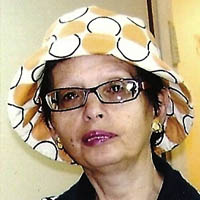
SEPTEMBER 2013
Born in Birmingham, England, U.K., Natalie Wood began working in journalism a month before the outbreak of the 1973 Yom Kippur War.
She remained in regional Jewish journalism for more than 20 years, leaving full-time writing to help run a family business and then completed a range of general office work.
Natalie Wood and her husband, Brian Fink emigrated from Manchester to Israel in March 2010 and live in Karmiel, Galilee where she continues to work from home, concentrating on creative writing.
Natalie Wood features in Smith Magazine’s new Six Word Memoirs On Jewish Life. She also contributes to Technorati, Blogcritics and Live Encounters magazine.
Read Natalie Wood’s stories at http://wwwperfectlywritefamilytales.blogspot.com and her general journalism at http://wwwalwayswriteagain.blogspot.com.
“Lines written on a Seat on the Grand Canal, Dublin”
O commemorate me where there is water
canal water preferably, so stilly
greeny at the heart of summer. Brother
commemorate me thus beautifully.
(Patrick Kavanagh)
Terry McDonagh is an Irish poet who lives mostly in Germany. I am a U.K.-born scribbler who emigrated to Israel. As we met through Live Encounters magazine, produced by Mark Ulyseas, an Indian travel writer based in Bali, it’s no surprise that we empathise hugely about exile, dislocation and loss.
Such themes are staple fair in the wistful world of wandering writers. It takes a fine craftsman with a painfully hewn imagination to make them fresh. But we expect no less from McDonagh. Surely the first Irish poet to be translated into Indonesian, he pays gracious tribute to his famous countryman, Patrick Kavanagh in this, his own verse.
Whose Life Was It! he muses in Grounds For Burial, the concluding eight-parter in his new collection.* He then answers himself:
…. especially
after a day among wet ridges and drills.
When his parents died, he was captured
by the poet, Kavanagh,
and trapped between his lines:
for all to sneer at,
for all to pity,
for all to scoff at as he faced into a fence
when desire became urgent.
McDonagh also treats us to several endearingly funny micro stories. How else to describe Body Language with its brief sketch played out on a Hamburg street, near his home in exile?
“A story fell ping into my lap as birds / continued singing for me / and for people I didn’t grow up with”.
Or let’s try A Perfect Family In Arles, where, avoiding a clichéd spin on the city’s associations with rakish artists, he opts for a look at four unlovely tourists en famille, emptying restaurant tables, entire streets even with their noise, while the raucous daughters scream “‘we’ve had enough of culture and vulture!’”.
I suppose it’s natural for a man from County Mayo to dwell, after Kavanagh, on rural small town life. But to be forced to select one of McDonagh’s poems on this theme is like being invited to dip a paw into a chocolate box. So for now it’s a case of ‘ooh, go on then’ and I’ll choose the hilarious Police and Donkey In a Hit and Run, in which the police “countrywide, / would be alerted and no money or manpower spared / in satisfying the courts that everything in police power had been done to show the donkey up in a bad light”.
For all that, even better are the quieter poems, like the title piece, Ripple Effect or its companion Journey of a Pebble, where McDonagh confesses to losing a much cherished stone picked up at the graveside of the blind Irish balladeer, Anthony Raftery. Initially, he’s saddened by the loss but concludes “Later I was satisfied – I had passed it on”.
* Ripple Effect was published in August by Arlen House @ €11.49 (approx. £9.90).
© Natalie Wood

